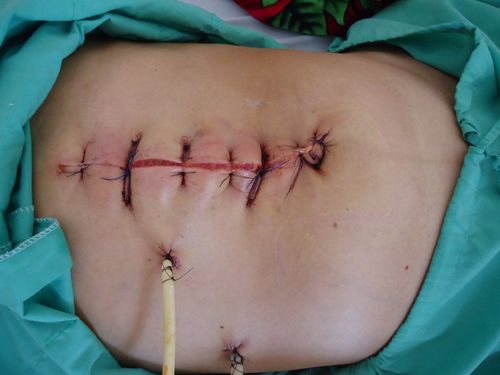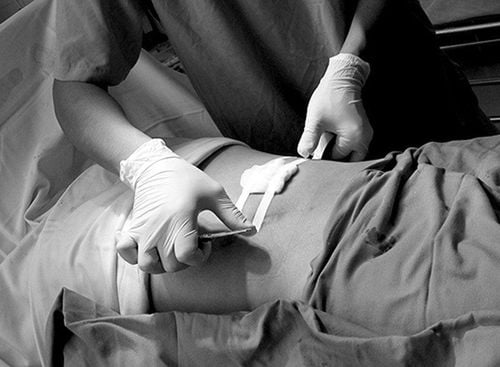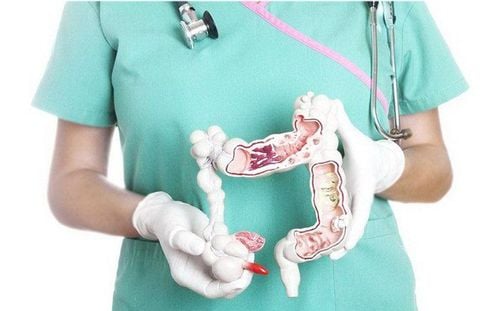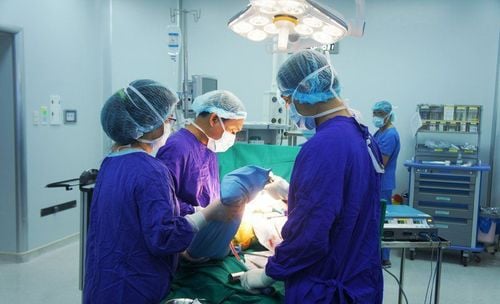This is an automatically translated article.
Incisional infection is a complication after surgery, prolonging hospital stay as well as reducing the chance of recovery. Therefore, it is necessary to know how to take care of the incision after discharge from the hospital, recognize early signs of infection for timely treatment.1. What is a surgical site infection?
Incisional infections are infections at the surgical site, from the time of surgery to 30 days after surgery with surgery without implants and up to one year postoperatively with surgery with implants. .Incisional infection is divided into 3 types with different characteristics and manifestations:1.1. Superficial wound infection
Infection occurs within 30 days after surgery, involving only the skin and subcutaneous tissues and the patient has at least one of the following manifestations:The incision is swollen, red, painful or the incision collects fluid ; Purulent discharge from a shallow incision; Isolation of microorganisms through aseptic culture of fluid or tissue from the incision.
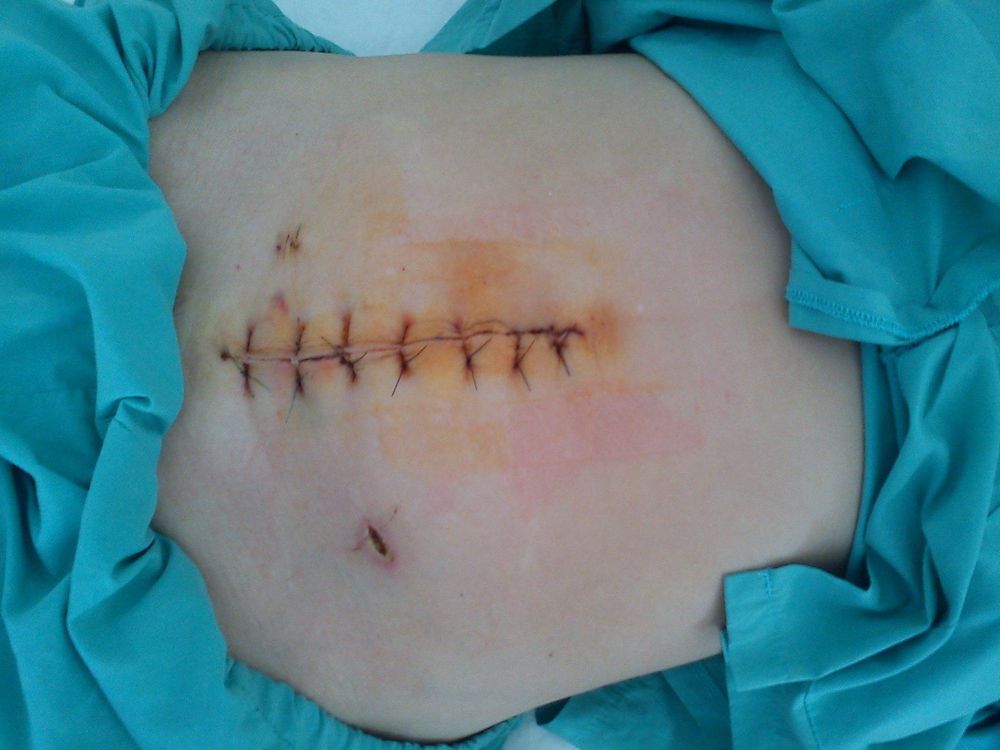
Nhiễm khuẩn vết mổ nông có biểu hiện vết mổ bị sưng
1.2. Deep wound infection
An infection that occurs within 30 days of surgery or within 1 year of surgery with an implant, is an infection in the deep soft tissue (muscle fascia) of the incision, and the patient has at least one of the following: the following symptoms:The incision is swollen, red, painful or the incision collects fluid and pus from the deep incision; Open the incision spontaneously or when the patient has a fever (≥ 38°C), severe pain or edema at the incision site, or an abscess, or other evidence of a deep incision as determined by direct examination. continued, during re-surgery or through histopathological examination, X-ray.
1.3. Infection of the surgical site in an organ/cavity
Infection at the site of an organ/cavity of any part of the body, with the exception of skin, fascia, and muscle incisions opened or manipulated during surgery. This infection occurred within 30 days of surgery or within one year of implantation surgery and the patient had at least one of the following symptoms:Purulent discharge from an intra-cavity drainage/ organ; Isolation of microorganisms through aseptic culture of fluid or tissue of an organ/compartment; Abscess or other evidence of infection involving an organ/compartment is confirmed by direct examination, during reoperation, or by histopathological or radiological examination.

Khi phát hiện nhiễm trùng vết mổ, bệnh nhân cần ở lại viện thuận tiện cho việc theo dõi tình trạng nhiễm khuẩn
2. What are the consequences of surgical site infection?
Infection of the surgical site is the most common adverse event and an important cause of death in surgical patients worldwide. This is the second most common postoperative infection, after urinary tract infections in the hospital. The percentage of surgical patients with surgical site infections varies from 2% to 15% depending on the type of surgery. Approximately over 90% of infections are of the superficial or deep type.
Infection of the surgical site leaves serious consequences for patients due to prolonged hospital stay, increased mortality and increased treatment costs. This is the reason for nearly 90% of deaths in patients. With some special surgeries such as transplant surgery, surgical site infection is the complication with the highest cost compared to other dangerous surgical complications and increases the average hospital stay by more than 30 days.
3. Can a wound infection be treated?
Most surgical site infections can be treated with antibiotics. The type of antibiotic used depends on the severity of the infection as well as the causative agent.
However, there are many patients with surgical site infections that require surgery to treat the infection, drain the pus in the body cavity or even remove the implanted instruments.
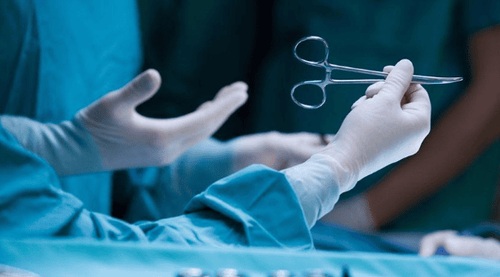
Bệnh nhân cần phải phẫu thuật lại đối với nhiễm khuẩn vết mổ tại cơ quan/ khoang cơ thể
4. What do doctors need to do to limit surgical site infections?
To prevent infection of the surgical site, doctors, nurses or general health care workers must follow surgical infection prevention guidelines. These instructions include:
Clean hands and arms up to the elbow with disinfectants immediately before surgery; Clean hands with soap and water or rub hands with alcohol before and after examining and caring for each patient; Wear the prescribed mask, gown and gloves during surgery; Remove jewelry from your hands, cut fingernails short, remove artificial nails, cover your hair, wear paper boots or sandals reserved for the surgical area; Members who are not directly involved in surgery must clean their hands with alcohol-based hand sanitizer according to routine hand hygiene procedures before entering the sterile area of the surgical area; Patients should be given antibiotics within 60 minutes before surgery begins and antibiotics should be stopped within 24 hours of surgery.
5. What can you do to prevent yourself from getting an infection?
5.1. Before surgery
Tell your doctor about any health problems you have such as allergies, diabetes, medications you are taking... as this can affect the chance of infection after surgery and how it is treated for you; Quit smoking. Patients who smoke were observed to have more infections;

Bệnh nhân nên bỏ hút thuốc lá tránh tình trạng nhiễm trùng lan rộng hơn
Do not shave, hair near the place where the surgery will be. Shaving with a razor can irritate the skin, scratch it, and increase the risk of infection.
5.2. After surgery
Do not arbitrarily remove the wound dressing; Ask family and friends visiting you not to touch the surgical wound or bandage it; Relatives should also wash their hands with soap and water or rub their hands with alcohol before and after visiting you. If you don't see them cleaning their hands, ask them to do so; Make sure you or your family member knows how to care for you before you leave the hospital; Always wash your hands with soap before and after caring for the wound.
6. How to properly care for the incision?
Most wounds do not require a dressing change one day after discharge, unless specifically directed by a doctor. The next day, you should remove the old bandage and change it with a new one every day for the next few days, until the wound is sutured and completely healed.
Cleaning the sutured wound surface and surrounding skin should be done with hands that have been washed with soap or an antiseptic solution. Should use tongs with cotton wool, gauze or soft cloth soaked in physiological saline solution. Then, gently wipe or dab on the surface of the wound. Next is to clean the skin around the wound, spreading within a radius of about 5cm. This sequence should be respected because it is easy to limit infection to the incision. Do not use skin cleansers, antibacterial soaps, alcohol, iodine or peroxide (hydrogen peroxide) and do not apply any lotions, moisturizers or oils, herbal solutions except when prescribed by a doctor. Finally, dry the wound with gauze and cover with clean gauze or a clean cloth.
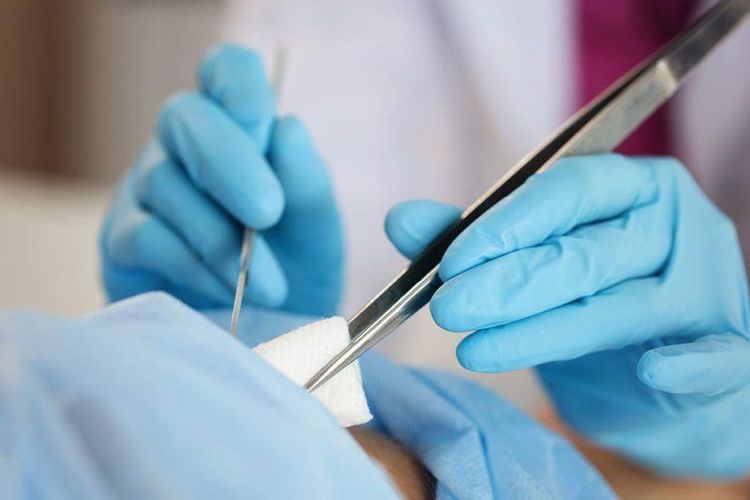
Sát khuẩn mọi công cụ trước khi lau vết mổ cũng như thay băng vết thương
7. When to tell the doctor?
You need to notify your doctor or go to a follow-up doctor soon if you see any of the following abnormalities in the postoperative wound:
Increasing pain; Redness or swelling; Bleeding or discharge of pus; Increased discharge from the wound; There is a bad smell; The wound looks bigger, deeper; Release the suture; The surrounding skin is edematous, painful or tender; Whole body tired, lethargic; Body temperature exceeds 38.5oC for more than 4 hours, The above symptoms suggest that the surgical incision may have become infected. The treatment at this time cannot be continued at home, but it is necessary to have the wound professionally cleaned by a medical staff and an additional systemic antibiotic is indicated. In rare cases, the surgeon will need to remove the suture to probe the risk of infection from the incision from the inside.
In short, the loss of skin surface integrity is inherently a risk factor for increased infection in general, and surgical site infection in particular. Hopefully the above information will help you take care of your wounds at home for yourself or your loved ones, prevent infection, help the incision heal quickly and achieve high aesthetics.
Vinmec International General Hospital is one of the hospitals that not only ensures professional quality with a team of leading medical doctors, a system of modern equipment and technology, but also stands out for its medical examination and treatment services. comprehensive and professional medical consultation and treatment; civilized, polite, safe and sterile medical examination and treatment space.
Please dial HOTLINE for more information or register for an appointment HERE. Download MyVinmec app to make appointments faster and to manage your bookings easily.
Reference source: cdc.gov




